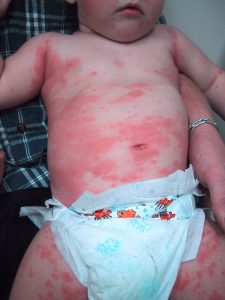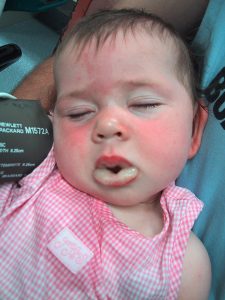Anaphylaxis (pronounced ana-fill-ax-is) is a severe and life-threatening allergic reaction that can be fatal. Severe symptoms such as:
a swollen tongue,usually develop suddenly, often within minutes after being exposed to an allergy trigger such as:
a particular food,When families send a child with allergies to pre-school, this can be a stressful time as it may be the first time they are handing over the care of their child to someone outside the family.
This article will provide parents and carers of pre-school age children with advice about managing allergies at pre-school and how to ensure good communication with pre-school staff.
Communication between staff and parents is vital. Staff should work with families to establish prevention and treatment strategies and staff training arranged so that every member of staff can recognise the signs and symptoms of anaphylaxis, understand how to minimise risk and know what to do in an emergency.
The signs and symptoms of a severe allergic reaction can be remembered by using the phrase think ABCDE.

Photo – Thanks to the Anaphylaxis Campaign and Professor Pete Smith © MedicalMediaKits.com
If someone is having a severe allergic reaction, it is vital that they receive an adrenaline injection as soon as possible. If they have their own adrenaline auto-injector, this must be given as soon as a severe reaction is suspected to be occurring and an ambulance must be called immediately.

Photo – Thanks to the Anaphylaxis Campaign and Professor Pete Smith © MedicalMediaKits.com
In the UK it is estimated that 5–8 %of children have a food allergy; peanut allergy is particularly common with up to 1 in 55 children thought to be affected. Children can also be allergic to non-food allergens such as natural rubber latex, bee or wasp stings or certain drugs.
Children who are at risk of severe allergic reactions are not ill in the usual sense. They are normal children in every respect – except that if they come into contact with a certain food or substance, they may become unwell. It is important that these children are allowed to develop in the normal way and are not stigmatised or made to feel different. All efforts should be made to ensure that children have the opportunity to participate in all activities.
Communication between staff and parents is vital. Staff should work with families to establish prevention and treatment strategies and staff training arranged so that every member of staff can recognise the signs and symptoms of anaphylaxis, understand how to minimise risk and know what to do in an emergency. There will need to be a system for informing temporary staff of medical information relating to any child, for example when regular staff are absent through holidays or sickness. Medication should be appropriately stored and easily accessible (i.e. not locked away) in a secure, central location.
Materials used in arts and crafts projects may contain food derived ingredients that may pose a risk and regular cleaning of surfaces and hand washing are also important. Some craft materials to consider include
Pre-school staff should be aware of the dietary and allergy requirements of children at risk and a commitment to reading food labels and maintaining vigilance is essential. Regular cleaning of surfaces and hand washing are also important. Other precautions to reduce risks could include labelling drinking cups and putting allergy warnings on bottles, treats and sweets brought in by other parents.
Whilst the Anaphylaxis Campaign does not advocate for a blanket ban on any allergen, in pre-schools, nurseries and infant classes, it is reasonable to ask parents not to allow children to bring certain allergens into school in their lunch or as birthday gifts, in order to reduce the risks of cross-contamination for particularly young and vulnerable children. It is good practice to have a ‘no sharing’ policy with food, and every effort needs to be taken to ensure that children with allergies do not take or accept food from another child’s packed lunch.
Children with allergies should have every opportunity to take part in trips out. These activities will need careful planning and preparation and a meeting with the child’s parents will be necessary to ensure that everyone is happy with the arrangements. If the child has been prescribed an adrenaline auto-injector, at least one person trained in administering the device must accompany the party.
Families can help the pre-school by ensuring there are clear channels of open communication between parents, carers and pre-school staff. Parents and carers should work with the pre-school to develop a plan that accommodates the child’s needs with the support of their doctor, school nurse, allergy specialist or paediatrician and review these regularly. Parents and carers should also provide written medical documentation, instructions and medications as directed by a doctor and replace medications after use or upon expiry. If your child has a food allergy, you may also wish to provide a ‘stash’ of safe snacks for special events.
Every child who is at risk of a severe allergic reaction, should have an up-to-date and accurate care plan in place which should be familiar to all staff in the pre-school.
The Paediatric Allergy Group of the BSACI (British Society for Allergy and Clinical Immunology) has developed Allergy Action Plans which are designed to facilitate first aid treatment of anaphylaxis, to be delivered by people without any special medical training nor equipment apart from access to an adrenaline auto-injector.
The plans are medical documents and should be completed by a child’s health professional, not by parents or teachers. Families should contact their GP or allergy specialist, complete the plans together and provide a copy to the school. You can access care plans from the BSACI website here: http://www.bsaci.org/about/pag-allergy-action-plans-for-children.
After two years of campaigning by the Anaphylaxis Campaign – together with Allergy UK, the British Society for Allergy & Clinical Immunology (BSACI), the British Paediatric Allergy Immunity and Infection Group (BPAIIG), and the Royal College of Paediatrics and Child Health (RCPCH) – in October 2017 the law changed to allow schools in the UK to buy adrenaline auto-injector devices without a prescription to use in an emergency on children who are at risk of a severe allergic reaction but whose own device is not available or not working. However, the legislation does not extend to pre-schools and nurseries unless they are linked to primary schools and maintained by their local authority.
The website www.sparepensinschools.uk– a collaboration between the Anaphylaxis Campaign, the BSACI, the RCPCH and Allergy UK – has been set-up to support schools, parents, students and healthcare professionals in implementing the new guidance from the UK Departments of Health to support children with food allergies in schools, and where appropriate, the use of emergency ‘spare’ adrenaline auto-injectors now permitted under UK legislation.
